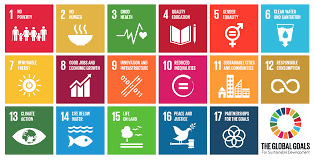Revised draft calls for putting the furthest behind first.
The co-facilitators of consultations on the 2017 Ministerial Declaration of the UN Economic and Social Council (ECOSOC) High-Level Segment and the UN High-level Political Forum on Sustainable Development (HLPF) released a revised draft, ahead of a reading by UN Member States on 20-21 June 2017. The joint declaration is expected to be adopted by the HLPF on 19 July 2017, and by the ECOSOC High-level Segment on 20 July 2017.
The HLPF will take place from 10-19 July 2017, in New York, US. It will consider the theme ‘Eradicating poverty and promoting prosperity in a changing world,’ hold an in-depth review of Sustainable Development Goals (SDGs) 1, 2, 3, 5, 9, 14 and 17, and hear 44 Voluntary National Reviews (VNRs) on implementing the SDGs at the country level.
The revised draft, issued on 19 June following informal consultations on the zero draft on 15-16 June, highlights the global SDG indicator framework agreed by the UN Statistical Commission, with Member States welcoming its adoption and looking forward to its implementation and “continual improvement in an inclusive manner.” The text stresses the need to build national capacities for follow-up and review.
Unlike the zero draft, the revised draft does not refer to the establishment of an interagency task force to provide further policy guidance towards national efforts to enhance policy integration for achieving the SDGs. The revised draft encourages countries to fully implement the Paris Agreement on climate change, or to deposit their instruments of ratification, acceptance, approval or accession as soon as possible, and stresses the importance of strengthening disaster risk reduction and early warning systems.
On SDG 1 (no poverty), the revised draft calls for putting the furthest behind first. It also highlights the need to: adapt institutions and policies to take into account the multidimensional nature of poverty and the interlinkages between different SDGs and targets, and to implement nationally appropriate social protection systems for all.
On SDG 2 (zero hunger), the draft notes that resilient, sustainable and inclusive food systems that protect natural resources, sustain rural and urban livelihoods, and provide access to nutritious foods from smallholder producers, must be at the heart of efforts to simultaneously eradicate poverty and hunger, ensure adequate nutrition and promote prosperity. It calls for urgently and effectively responding to rising crises and emergency levels of food insecurity, affecting millions of people. The revised draft does not refer to the Accelerated Agriculture and Agro-industry Development Initiative PLUS (3ADI+) or the Programme for Country Partnerships, which were mentioned in the zero draft.
On SDG 3 (good health and well-being), the revised draft stresses the need to step up efforts to combat communicable diseases, to strengthen preparedness to respond to epidemic outbreaks, and to promote investment in scientific research and innovation to meet health challenges. On SDG 5 (gender equality), the draft notes the “mutually reinforcing links” between the achievement of gender equality, the empowerment of all women and girls and the eradication of poverty, as well as the need to ensure an adequate standard of living for women and girls throughout the life cycle. It also calls for implementing all other SDGs in a manner that delivers results for women and girls.
On SDG 9 (industry, innovation and infrastructure), the draft highlights the importance of innovation-driven development and the growth of micro-, small and medium-sized enterprises (MSMEs). On SDG 14 (life below water), the draft calls on all stakeholders to urgently undertake the actions highlighted in the Call for Action adopted during the UN Ocean Conference and to implement the voluntary commitments pledged during that Conference.
On SDG 17 (partnerships for the goals), the draft stresses that strengthened multi-stakeholder partnerships are instrumental in achieving poverty eradication and the SDGs. It encourages the UN system to share knowledge and best practices on partnership approaches with a view to improving transparency, coherence, due diligence, accountability and impact. By the text, Member States would encourage continued support for operationalizing the Technology Facilitation Mechanism (TFM) and the Technology Bank for the Least Developed Countries (LDCs).




